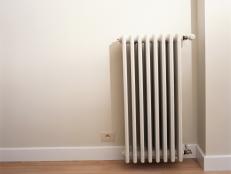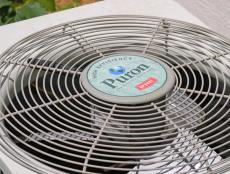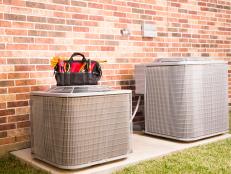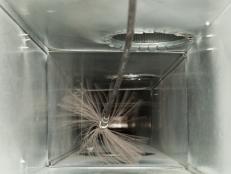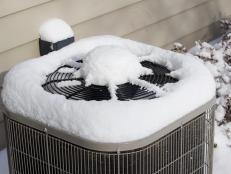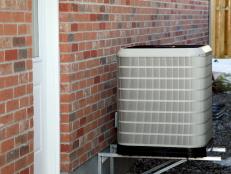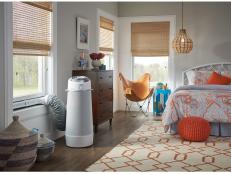Choosing the Right Heating System: Heat Pump vs. Furnace?
Compare systems to understand the benefits for your home based on your geography and household needs. The right system will help improve your home's energy efficiency and reduce utility costs.

Is it time to update your home’s heating and cooling system? Whether your HVAC specialist dropped this news on you during your last tune-up or you’re staring down your bank account after a long, cold winter, homeowners should be prepared to consider upgrades for home efficiency.
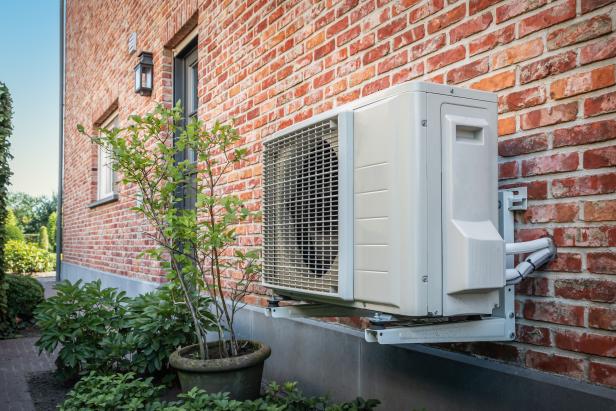
NAPA
Heat pump installed on the wall of a brick home.
Heat pumps and furnaces are both systems that help you control the indoor air temperature of your home. There are many factors and considerations to keep in mind as you make upgrades to your own home’s heating and cooling systems. Learning more about the different solutions for your residence will make it easier to understand opportunities and efficiencies that can save you money in the long run.
As you learn more, keep in mind the following:
- How these systems work
- Energy efficiencies
- Your home’s zone and wintertime temperatures
- Space and sizing requirements for your home
Heat Pumps
Electric heat pumps use the exterior air temperature to heat and cool your home. They serve as a heat source in cooler months and an air conditioner during the summer.
“A heat pump is a vapor-compression cycle refrigeration system that can be reversed to either heat or cool a controlled space,” shares Katie Davis, vice president of engineering and technology at Trane Residential. “Heat pumps are powered by electricity, so [homeowners] can save substantially on fuel consumption. Heat pumps deliver two to five times more energy out than is required to power them.”

Trane
Air-sourced heat pump outside of an apartment building.
The biggest limitation for homeowners who want a heat pump instead of a furnace is climate. Air-sourced heat pumps are ideal for warmer climates where winter temperatures rarely dip below 30-40 degrees.
As an alternative to air-sourced heat pumps, geothermal heat pumps have been more readily introduced in colder zones. Geothermal systems use heat from the Earth to regulate indoor temperatures and fulfill both heating and cooling needs year-round but are more costly for homeowners to install.
- Average lifespan: 15 years
- Energy source: Uses electricity, not fuel.
- Clearance requirements: Requires less clearance outside of the home (24” on average, but it may vary by local codes). It also requires an indoor fan coil air handler.
- Two-for-one system: Warms and cools indoor air using one unit, which eliminates the need for a separate air conditioning system.
- Maintenance and repairs: May require more repairs as it is used year-round for both heating and cooling.
- Energy-efficiency: Air-sourced systems are less efficient in cold temperatures. Geothermal systems are more efficient but also more cost-prohibitive.
Furnaces
Conventional furnaces operate by converting fuel to heat, which circulates through your home’s forced air system. They are more widely used in geographies that endure long winters where temperatures are frequently or steadily below freezing. A furnace is turned off and out of use during the summer months.
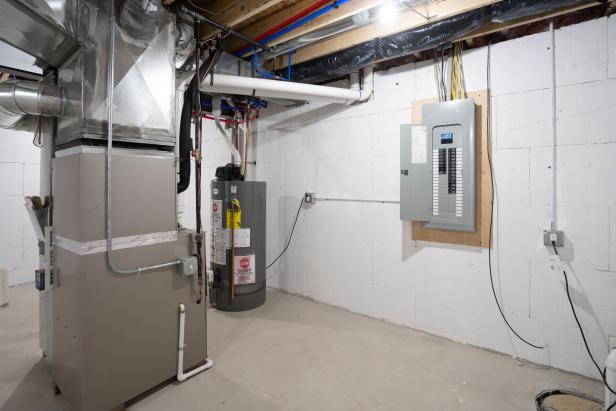
J.A. Dunbar
Home basement updated with a new furnace.
Furnaces do not cool your home unless connected to an air conditioning unit or a separate heat pump. A homeowner would need to invest in a separate system for cooling during the summer.
- Average lifespan: 20+ years
- Energy source: Traditionally powered by natural gas, propane fuel or oil. There are also electric furnaces that are advantageous in cold zones where there is also low electricity pricing.
- Clearance requirements: Require more space inside a home (30” on average, but it may vary by local codes).
- Single system: Furnaces only produce heat. Homeowners need to connect it to a heat pump or air conditioning unit to supply cool and conditioned air inside a home.
- Maintenance and repairs: May require fewer repairs than a heat pump, as it has fewer parts that can break down or malfunction over time, especially as it is only operated a few months every year.
- Energy-efficiency: Systems are usually more efficient in cold temperatures; however, costs for fuel can cause fluctuation in utility bills.
Duel-Fuel Systems
Hybrid systems have also gained popularity across colder climates, so if the perks of a traditional heat pump system appeal to you, consider this option.
Duel-fuel systems incorporate an electric heat pump and a gas furnace for comfort, convenience and energy efficiency. “Duel-fuel systems are ideal for those who want the heat of a furnace for bitter temperatures but also want to benefit from the efficiency, cost savings and the lessened carbon footprint of electric heating for milder temps,” says Davis. “The system alternates between using each of the two devices, depending on the season, temperature and the function needed, to maximize efficiency and effectively heat and cool your home all year long.”

Trane
The heat pump system functions with an exterior unit and an indoor air handler. Temperature is controlled by a unit on the wall.
FAQs
Are Heat Pumps More Energy Efficient?
Both heat pumps and furnaces are marketed as high-efficiency systems, but where they are installed and how they are used makes a big difference.
“Under ideal conditions, a heat pump can transfer 300% more energy than it consumes,” says Davis at Trane. “Heat pumps also emit zero of the harmful emissions that have been proven to contribute to climate change.”
Homeowners with very low electric utility costs can operate a heat pump very efficiently; however, if that homeowner is heating their home through long winters, they need to consider the trade-off of having a gas furnace, which operates more efficiently in cold weather.
“In colder climates, 95% efficient gas furnaces fare better than ENERGY STAR® heat pumps. And, due to the relatively lower cost of natural gas versus electricity, lifetime operating costs should be considered as well,” counter the experts at Carrier.
Do Furnaces Last Longer Than Heat Pumps?
Furnaces do last longer than heat pumps, on average. This is because a furnace is only used for roughly half of the year when homeowners need to heat their space. They tend to require fewer repairs over time. That said, if a homeowner uses both a furnace and air conditioning system, there are two systems that need maintenance. Compared to a single heat pump that performs both functions, the cost-benefit analysis based on the longevity of the system is up for debate.
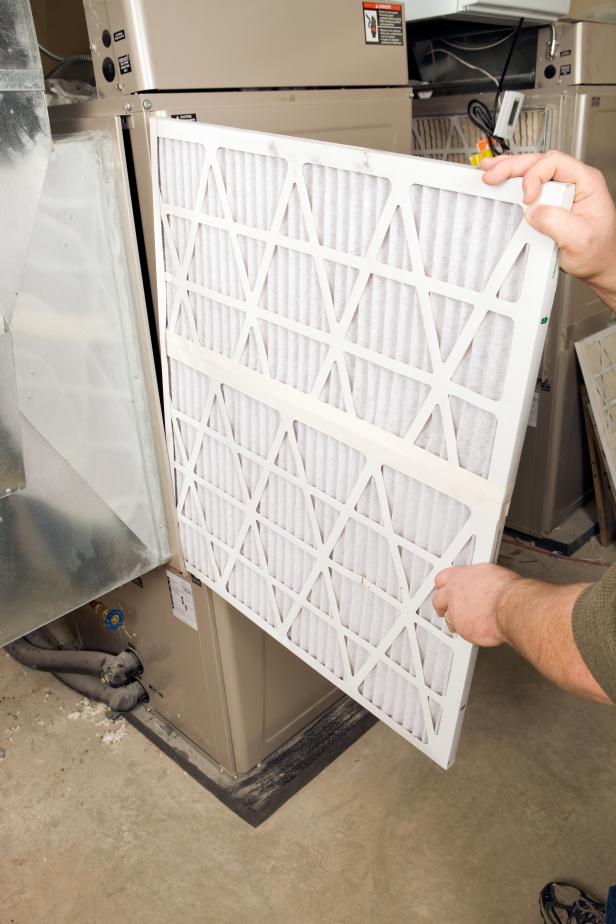
Getty Images/Banks Photos
Changing the air filter on an indoor furnace.
How Do Maintenance Requirements Vary?
Heat pumps and furnaces both benefit from an annual tune-up. Both also require air filter changes as part of regular maintenance. Filter changes ensure good indoor air quality and are required several times a year, but you won’t need to hire an HVAC specialist to complete this chore. Both heat pump and furnace filters are easily changed by a homeowner every 60 to 90 days (longer, if the system uses four-inch filters).
Heat pumps have more parts that can break, and furnaces may have pricier repairs when they do arise, so maintenance costs may be a wash if you’re comparing the expense over the lifetime of each system.






